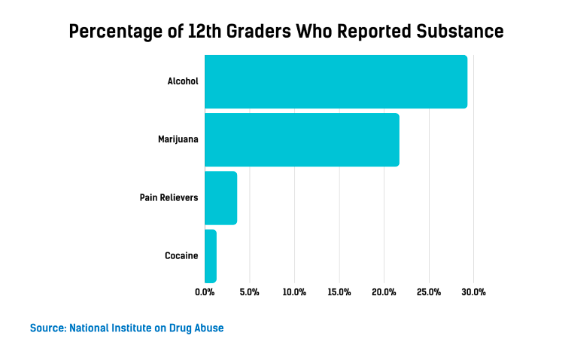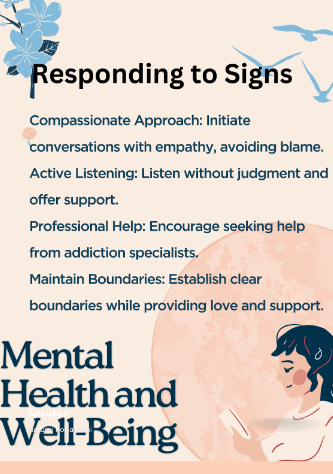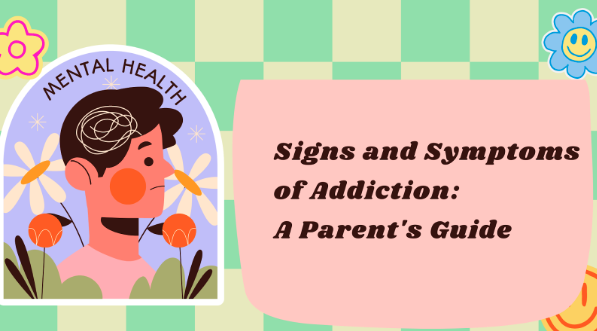As a parent, nothing is more alarming than witnessing changes in your child’s behavior or physical well-being. The mere thought of substance abuse among youth can send shivers down your spine, leaving you feeling anxious and overwhelmed.
But you are not alone in this journey. Recognizing the signs of addiction early on is vital. It’s a tough reality, but the National Institute on Drug Abuse reports that a staggering 96% of individuals seek help only after experiencing significant consequences of addiction. You don’t want to wait until things reach that point.
In this guide, we’re here to support you every step of the way. We’ll delve into the physical, behavioral, and psychological indicators that could signal your child’s struggle with addiction. Together, we will navigate the complexities of family dynamics impacted by substance abuse.
You’ll gain insight into effective intervention strategies, explore various treatment options, and discover invaluable support resources for both your child and yourself. Throughout this journey, remember that self-care is not selfish—it’s essential.
As you embark on this challenging path, know that you’re not alone, and there is hope for recovery. Let’s embark on this journey together and equip ourselves with the knowledge and tools to make a positive difference in your child’s life. Let’s dive in.
Recognizing the Physical Warning Signs
The physical effects of addiction can manifest in various ways. The prevalence of substance use among 12th graders in the United States serves as a stark reminder of the widespread nature of substance experimentation among adolescents, with significant percentages reporting recent use of various substances.

Being alert to the following changes can help identify an emerging substance abuse problem:
Significant Weight Loss or Gain
Unhealthy fluctuations in weight or appetite may signal addiction issues. According to the National Institute on Drug Abuse, approximately 70% of individuals struggling with addiction show noticeable weight change. Some substances directly impact appetite and metabolism. Others indirectly lead to weight shifts due to side effects or the replacement of food with drugs.
Changes in Sleep Patterns and Energy Levels
Disrupted sleep is a common indicator of substance abuse. A National Sleep Foundation survey revealed that 95% of individuals with addiction experience some sleep disturbance. Difficulty falling asleep, frequent waking, excess fatigue during the day, or suddenly having boundless energy can reflect an addiction problem.
Decline in Personal Grooming and Hygiene
Lack of interest in personal hygiene – such as rarely bathing, wearing dirty clothes, or appearing unkempt – is a potential red flag. Especially contrasted with a previously well-groomed appearance, this signifies that addiction may be taking priority over self-care.
Physical Health Issues
General ill health, nosebleeds, sinus infections, coughing, nausea, vomiting, tremors, slurred speech, bloodshot eyes, and dilated pupils are physical manifestations of substance abuse on the body. Specific types of substances often lead to unique physical side effects.
Being attentive to changes from your child’s normal physical presentation and overall wellbeing can reveal early signs of addiction. Don’t hesitate to lovingly express your concern and desire to understand what may be impacting their health.
Impaired Cognitive Function and Decision Making
Substance abuse can lead to noticeable impairments in cognitive function and decision-making abilities. This includes difficulty concentrating, memory lapses, poor judgment, and making decisions that are out of character or risky.
These cognitive changes often result from the direct effects of substances on the brain’s ability to process information and control impulses. Recognizing these signs is crucial, as they can indicate an underlying addiction problem, impacting not only the individual’s health but also their ability to perform daily tasks and make safe choices.
Children sometimes try drugs like opiates because of peer pressure, stress, or curiosity, not realizing the risk of addiction. At first, use might be occasional, but over time, they may need more of the drug to feel its effects, leading to dependence and increasing the risk of addiction.
This can seriously harm their physical and mental health. Beating opiates addiction is tough because of withdrawal symptoms and its mental hold, but with proper support and rehab, recovery is achievable. Rehab offers medical detox, strategies to handle cravings, and therapy to tackle root causes. Support from loved ones and professionals is crucial, requiring patience and a comprehensive approach to success.
Spotting the Behavioral Warning Signs
Beyond physical symptoms, behavioral shifts in your child can also alert you to a developing substance abuse problem:
Declining Academic Performance
A sudden disinterest in school, falling grades, repeatedly missing classes, and disciplinary problems may all stem from an addiction issue. According to the National Council on Alcoholism and Drug Dependence, 40-60% of students with substance abuse disorders experience a decrease in academic achievements.
Neglecting Self-Care
Lack of interest in grooming, hygiene, nutrition, exercise, and other facets of self-care can be behavioral manifestations of addiction. Especially in a previously responsible teen, such neglect points to larger issues requiring attention.
Withdrawing from Usual Activities
When your once sports-loving child quits the school team, or your previously creative teen abandons their artistic pursuits, it may indicate addiction supplanting positive interests. Studies show 80% of individuals struggling with addiction lose interest in hobbies they previously enjoyed.
Secretive Behavior
If your formerly open child starts becoming evasive about where they go, who they’re with, and what they’re doing, it’s cause for concern. The Substance Abuse and Mental Health Services Administration reports 60% of individuals battling addiction exhibit secretiveness or suspicious behaviors.
Aggression and Irritability
Lashing out, having a short temper, picking fights, and blowing up over minor frustrations can all stem from addiction issues. Look out for drastic personality changes involving anger and volatility.

Legal Issues
Substance abuse may lead to behaviors like stealing and confrontations with the law. Possessing drug paraphernalia, selling illicit substances, driving under the influence, and getting arrested are all signs of significant problems.
Dishonesty
One of the most troubling behaviors is when a truthful child becomes prone to lying. Making excuses, deceit, and covering up the truth with elaborate stories are typical of individuals hiding an addiction. By tuning into your child’s behavioral health, you can detect problematic changes that may point to an underlying addiction issue.
Watching for Emotional and Psychological Symptoms
Along with physical and behavioral signs, your child’s psychological state provides important clues regarding potential addiction problems:
Recognizing the signs of addiction in someone you care about, especially a child, can be deeply troubling. Substance abuse can significantly alter a person’s behavior, mood, and overall well-being. Here’s how you can interpret and respond to the behaviors associated with addiction:
Mood Swings
Substance abuse can cause extreme fluctuations in mood, from euphoria to deep sadness. These changes might seem sudden and out of character for the individual. It’s important to approach these situations with empathy and understanding, acknowledging that these mood swings might be symptoms of a deeper issue.
Increased Irritability and Aggression
Addiction can lead to increased feelings of frustration and aggression. This behavior is often a departure from the individual’s normal demeanor. Offering a non-judgmental space for them to express their feelings and frustrations can be a crucial step in addressing the root cause of their irritability.
Lack of Motivation
A noticeable drop in enthusiasm and interest in activities they once enjoyed can be a sign of substance abuse. This lack of motivation is often accompanied by a decline in performance at school or work. Encouraging open conversations about their interests and feelings can help identify if substance abuse is a contributing factor.
Withdrawal From Family and Friends
Isolation is a common behavior in individuals struggling with addiction. They might withdraw from social interactions, preferring to spend time alone. It’s important to gently encourage communication and make it clear that you are there to support them without judgment.
Anxiety and Paranoia
Substance abuse can exacerbate or trigger feelings of anxiety and paranoia. Creating a supportive environment where they feel safe to share their fears and anxieties without fear of reprimand or disbelief is crucial.
Responding to Signs of Addiction
If you recognize these signs in your child or someone you care about, the most important step is to approach the situation with compassion and understanding. Addiction is a complex issue that requires professional intervention and support.
Encourage them to seek help from healthcare professionals who specialize in addiction treatment. It’s also beneficial for families to seek support through counseling or support groups to navigate the emotional challenges of supporting a loved one through recovery.
Remember, the journey to recovery is often long and fraught with challenges. Your consistent support, patience, and understanding can make a significant difference in your loved one’s path to healing.
Recognizing the Family Impact
Seeing these troubling signs in your child stirs up intense emotions. But addiction does not just affect the individual – it has profound ripple effects on the family system:
Communication Breakdown
According to the National Council on Alcoholism and Drug Dependence, 40-60% of families with a member battling addiction experience dysfunction in communication. Conversations become strained, trust deteriorates, and truths go unspoken, driving family members apart.
Strained Relationships
Addiction breeds resentment, misunderstanding, and hostility between parents, siblings, and the addicted child. The family bond frays, as substance abuse becomes the main point of focus.
Emotional Toll on Family Members
Studies by the National Institute on Drug Abuse show 85% of family members dealing with a loved one’s addiction report experiencing ongoing stress, anxiety, fear, anger, and guilt. Coping with those emotions often leads to personal mental health struggles.
Social Stigma and Isolation
Many families feel ashamed having a child with addiction, leading them to withdraw and avoid discussing it with friends and relatives. This social isolation and stigma compounds the distress of the situation.
Acknowledging addiction’s erosive impact on family relationships underscores the importance of early intervention. Healing the family dynamic requires addressing these core issues openly through counseling, education, and mutual support.
Approaching Intervention
With a multifaceted perspective of addiction’s manifestations, you are ready to take steps toward intervention. Here is how to initiate this delicate process:
Choose the Right Time and Setting
Don’t confront your child about addiction spontaneously in a public space or while they are intoxicated. Set up a meeting when you are both calm and in a private, comfortable setting. Make sure to allow ample uninterrupted time for a thoughtful discussion.
Communicate Openly With Compassion
Avoid sounding accusatory or ashamed. Express your concerns through “I feel…” statements, focusing on how their changes are impacting you emotionally. Demonstrate your unconditional love while directly yet gently addressing behaviors that reveal addiction issues.
Listen With an Open Mind
Let your child share their perspective without judgment. Seek to understand the underlying causes driving their substance abuse, such as mental health struggles, academic stress, social pressures, or trauma.
Develop a Game Plan Together
Collaboratively discuss next steps, like consulting doctors and therapists, attending support groups, considering treatment programs, modifying unhealthy dynamics, and creating healthy routines. A family commitment to positive change is vital.
With love, honesty, and teamwork, you can have constructive conversations that lead to much-needed interventions. Your child’s sense of agency in the process will get results.
Exploring Treatment and Recovery Options
If your child agrees they need help, you can navigate appropriate treatment and recovery pathways together:
Inpatient vs Outpatient Programs
Inpatient facilities provide 24/7 structured care with medical supervision, whereas outpatient offers periodic intervention while living at home. Consider your child’s addiction severity, personality, and home environment when choosing between these options.
Detoxification
Medically managed detox entails withdrawing from substances under physician care. This controls dangerous side effects and eases cravings. Detox paves the way for therapeutic treatment.
Individual and Group Counseling
Through cognitive behavioral therapy, motivational enhancement therapy, contingency management, and support groups, your child can get to the root of their addiction issues. Developing coping skills is essential.
Medication Management
Certain medications help control addiction symptoms and prevent relapse. Doctors specializing in addiction can advise on helpful pharmaceutical interventions.
Holistic Therapies
Yoga, acupuncture, art and music therapy, equine therapy, and mindfulness training help heal mind, body, and spirit in the recovery process. Integrating these with traditional treatment shows the best success rates.
With professional guidance, you can create a customized treatment plan meeting your child’s specific needs and goals. Their active involvement will lead to greater commitment and progress.
Offering At-Home Support
As your child undergoes treatment, you play a pivotal role in their recovery by adapting the home environment:
Foster Open Communication
Keep communication compassionate and judgment-free. Check in regularly about challenges and wins. Rebuild family closeness through weekly meetings to share feelings.
Establish Boundaries
Set clear rules and expectations, enforced through fair discipline like rewards and consequences. Boundaries create needed structure and consistency.
Modify Daily Routines
Introduce healthy new routines involving proper sleep, nutrition, exercise, family time, volunteering, mindfulness practices, and recreational activities. Structure minimizes temptation and boredom.
Manage Triggers
Reduce access to addictive substances in your home. Keep alcohol locked up and medications secured. Limit exposure to high-risk settings and peers. Create an environment conducive to recovery.
Pursue Family Counseling
Address any family dysfunction through sessions with a therapist specializing in addiction issues. Healing family communication patterns and dynamics is vital.
With a supportive home base, your child has a safe space to reflect on and apply their treatment learnings. Consistent encouragement through the ups and downs prevents relapse.
Prioritizing Self-Care as a Parent
On this journey with your child, remember your own well being requires focus:
Make Time for Your Own Needs
Carve out time for relaxation through yoga, massage, recreation, and nurturing social connections. Burnout threatens your ability to help your child.
Process Your Emotions
Work through feelings of guilt, grief, anger, shame, and trauma through counseling and journaling. Copying constructively enhances your resilience.
Educate Yourself on Addiction
Learning about addiction as a chronic condition reduces self-blame and stigma. Knowledge empowers you to make informed choices to support recovery.
Expect Setbacks
Relapses and setbacks are part of the lifelong process of addiction management. Respond calmly and access additional treatment resources when needed.
A replenished, resilient you becomes a stable anchor for your child. Lead by example on healthy coping and maintaining hope along the twisting road of recovery.
Conclusion
Noticing physical, emotional, and behavioral warning signs early and understanding addiction’s family impact allows parents to compassionately intervene. While the path of treatment and recovery has challenges, families can weather the storm by advocating for their child, adapting their home life, and practicing self-care. With education, support, structure, and loving perseverance, recovery is possible.
If you see potential signs of addiction in your child, seek immediate help. Contact local treatment resources for a professional assessment. Join a support group for parents to find compassion and practical guidance. Have courage – with the right help, families can rise above addiction’s tribulations. Your child needs you, so take the first step today!
FAQs
- What are the common signs that my child might be struggling with addiction?
Signs include changes in behavior, mood swings, secretive behavior, decline in academic or work performance, and neglecting responsibilities.
- How can I differentiate between normal teenage behavior and signs of addiction?
Look for patterns of excessive behavior, such as consistently staying out late, neglecting personal hygiene, or drastic changes in social circles.
- What are some physical signs of addiction I should watch out for?
Physical signs may include bloodshot eyes, sudden weight loss or gain, changes in appetite, tremors, and unexplained injuries.
- Is it possible for my child to be addicted to something without me knowing?
Yes, addiction often starts subtly and can be hidden. Be vigilant for changes in behavior or habits that may indicate a problem.
- Can addiction manifest differently depending on the substance or behavior?
Absolutely. While some signs like mood swings and withdrawal are common, the specific behaviors may vary depending on what your child is addicted to.
- How can I approach my child if I suspect they have an addiction?
Approach the conversation with empathy, avoid blaming or accusing language, and express your concern for their well-being.
- What if my child denies having a problem?
Keep the lines of communication open, express your love and concern, and offer support. Consider seeking professional help if needed.
- Should I monitor my child’s activities if I suspect addiction?
Yes, monitoring can be necessary for their safety. However, balance this with respect for their privacy and autonomy.
- Are there any genetic factors that could contribute to addiction?
Yes, genetics can play a role in predisposing individuals to addiction. If addiction runs in your family, it’s important to be especially vigilant.
- What role does mental health play in addiction?
Mental health issues such as depression, anxiety, or trauma can often coexist with addiction, and addressing these underlying issues is crucial for recovery.
- How can I support my child in their journey to recovery?
Offer unconditional love and support, educate yourself about addiction, encourage them to seek professional help, and be patient through the ups and downs of recovery.
- What are some warning signs that my child’s addiction is worsening?
Signs may include increased tolerance, withdrawal symptoms, legal issues, financial problems, and deterioration in physical or mental health.
- Should I be worried about my child’s friends if they’re showing signs of addiction?
While it’s important to be aware of your child’s social circle, focus on supporting your child rather than blaming their friends. Encourage healthy friendships.
- Can addiction be treated successfully?
Yes, addiction is treatable, and many people recover and lead fulfilling lives with the right support, treatment, and resources.
- What resources are available for parents of children struggling with addiction?
Resources include support groups, therapy for both your child and yourself, addiction treatment centers, and educational materials from reputable sources.

